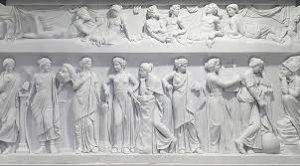Ancient Healers: Enduring Medical Legacy

Jump to Section
Ancient physicians stand out as renowned pioneers in the vast history of humanity, whose significant contributions and outstanding devotion to healing have forever changed the course of medicine. These early healers explored the unexplored territories of comprehending the human body and its illnesses while frequently operating against the backdrop of ancient civilisations. Despite being outdated by today’s standards, their expertise and methods served as the foundation for contemporary medicine.
Ancient physicians were explorers of the human condition who used a combination of curiosity and resourcefulness to solve the mysteries of the body and mind. These medical pioneers worked to understand the complexities of health and disease, from the banks of the Nile in ancient Egypt to the busy streets of Athens. They planted the seeds of medical knowledge that would eventually grow into the elaborate and complex medical systems we have today.
Ancient medicine had a vast and varied history that included many different civilisations and customs. Imhotep and other doctors who practised surgery and herbal medicine in ancient Egypt left behind documents of their medical knowledge. Hippocrates is a well-known historical figure who founded medical ethics and scientific observation in ancient Greece. Ayurveda and Traditional Chinese Medicine (TCM) both developed concurrently in ancient India and China, giving holistic methods of healing that have withstood the test of time.
Ancient physicians paved the way for the development of medicine throughout the years with their never-ending quest for knowledge and unwavering commitment to easing suffering. Their knowledge and skill were developed via observation, trial and error, and a strong desire to fully understand the workings of the human body. As we travel through history, we find a riveting story about how these pioneering doctors helped to alter medicine and leave a lasting impact that is still felt in the halls of contemporary healthcare.
The History of Medicine In Ancient Egypt
In the heart of the Nile River valley, thousands of years ago, the ancient Egyptians achieved important advances in medical knowledge. In this prehistoric society, doctors like Imhotep were instrumental in improving medical knowledge. They used natural cures, performed surgery, and set fractured bones. An early medical text called the Ebers Papyrus provided a window into their medical practises by presenting a vast range of therapies for various illnesses.
The ancient Egyptians had a significant impact on healthcare and medicine in India, particularly through the transmission of their knowledge of herbal medicine and surgery. The Ebers Papyrus, one of the oldest known medical texts, contains hundreds of recipes for herbal remedies, and many of these plants are still used in traditional Indian medicine today. The Edwin Smith Papyrus, another important medical text, describes a variety of surgical procedures, including setting bones, suturing wounds, and removing tumours. These techniques were adopted by Indian physicians, and they helped to advance the development of surgery in India. Healthcare and medicine are two of the largest and most growing sectors in the Indian economy. The demand for healthcare professionals is high, and there are many different career opportunities available in this field. India is also a major centre for medical education and research, and there are many opportunities for healthcare professionals to advance their careers.
Ancient Greece’s Hippocrates and the Origins of Medicine
Hippocrates, a well-known historical person who lived in the birthplace of Western civilisation, became a significant factor in the development of medicine around 400 BC. Hippocrates, who is frequently referred to as the “Father of Medicine,” emphasised the value of thorough diagnosis and observation. He developed moral standards, focusing on a patient-centred approach and the renowned Hippocratic Oath, an oath still sworn by contemporary doctors and highlighting the core of medical ethics.
Hippocrates’s influence on healthcare and medicine in India can be traced back to the early centuries AD, when his writings were translated into Sanskrit. His ideas about the importance of observation and evidence-based practise were adopted by Indian physicians, and his Hippocratic Oath is still used today as a code of ethics for physicians. In addition to his influence on medical ethics, Hippocrates also had a significant impact on clinical practise in India. He was one of the first physicians to develop a systematic approach to diagnosis and treatment, and his ideas were adopted by Indian physicians. For example, Hippocrates emphasised the importance of taking a patient’s medical history and physical examination, and he developed a variety of diagnostic techniques, such as palpation and percussion.
He also developed a variety of treatments, such as herbal remedies, surgery, and physical therapy. The scope of clinical practise in India is also growing due to the increasing prevalence of chronic diseases such as heart disease, cancer, and diabetes. These diseases require complex and ongoing care, which is creating new jobs and opportunities for healthcare professionals in a variety of fields, including endocrinology, oncology, and cardiology.
Galen and the Influence of Rome
As we advance in time, we meet the renowned doctor Galen, whose impact peaked during the Roman Empire. His research covered pharmacology, anatomy, and physiology. Galen’s exhaustive anatomical investigations and copious writings had a significant impact on medical knowledge and helped pave the path for advances in surgery in the decades that followed.
Galen’s theory of humorism, which held that the body was made up of four fluids (blood, phlegm, yellow bile, and black bile) and that disease was caused by an imbalance of these fluids, was widely accepted by Indian physicians. Galen also made significant contributions to the development of surgery, and his surgical techniques were adopted by Indian surgeons. India offers a wide range of popular and highly sought-after surgical specialities. General surgery, which encompasses a broad spectrum of procedures, is in high demand. Neurosurgery, dealing with the intricate workings of the nervous system, attracts skilled surgeons. Orthopaedic surgery, focusing on bones and joints, is also a popular choice. Cardiothoracic surgery, specialising in heart and lung conditions, is in high demand due to the rising prevalence of cardiovascular diseases. Paediatric surgery, plastic surgery, urology, gynaecology, oncology, and vascular surgery are other specialities that are highly sought after in India, reflecting the diverse needs of patients.
Ayurveda, Traditional Indian Knowledge
We explore the history of Ayurveda, a more than 5000-year-old holistic medical system, in ancient India. In order to sustain health, Ayurveda placed an emphasis on maintaining balance in the body and mind by using medicines, nutrition, and lifestyle choices. Ancient Indian doctors like Charaka and Sushruta contributed significantly to this holistic medical system, having a lasting influence on modern medical procedures.
One of the key ways in which Ayurveda has influenced Indian medicine is through its emphasis on prevention. Ayurvedic practitioners firmly believe that by maintaining a healthy diet, lifestyle, and mind-body balance, one can effectively prevent the onset of diseases. This preventive approach is a significant departure from conventional medicine, which often focuses on treating symptoms rather than addressing the root cause. Additionally, Ayurveda relies heavily on natural remedies derived from herbs, spices, minerals, and even yoga. These remedies are not only considered safe and effective but are also frequently used alongside conventional medicine to provide a holistic approach to healing.
The career, demand, and scope of Ayurveda in India today are very positive. The Indian government is actively promoting Ayurveda, and there is a growing demand for Ayurvedic practitioners and products. There are many different career opportunities available in Ayurveda. Ayurvedic practitioners can work in a variety of settings, including hospitals, clinics, spas, and wellness centres. They can also work as private practitioners or as consultants to businesses and organisations.
TCM, or Traditional Chinese Medicine
Over a long period of time, Traditional Chinese Medicine (TCM) developed in the vast and historic country of China. Acupuncture, herbal medicine, and other therapies were all incorporated into TCM because of its emphasis on balancing energies and maintaining harmony inside the body. TCM was heavily impacted by practitioners like Huangdi Neijing, who emphasised the value of prevention and the connection between the mind, body, and spirit.
In India, Traditional Chinese Medicine (TCM) has made a significant impact on healthcare and medicine. One of the key contributions of TCM is its emphasis on prevention and early intervention. TCM practitioners believe that by maintaining a healthy diet, lifestyle, and balancing the body’s energy, diseases can be prevented. Additionally, TCM relies on natural remedies such as herbs, spices, minerals, and acupuncture to treat and prevent ailments. These remedies are considered safe and effective, often used alongside conventional medicine. TCM’s holistic approach to health is also valued in India, as it recognizes the interconnectedness of physical, mental, and emotional well-being. By treating the whole person, TCM aims for true healing.
The scope of TCM is also expanding, with new research and developments being made all the time. For example, TCM is being used to develop new treatments for cancer, heart disease, and other chronic diseases. TCM is also being used to develop new products, such as herbal supplements and skincare products.
Islamic Renaissance and Medical Advances
A flurry of scientific and medical advancements occurred in the Islamic world between the eighth and fourteenth centuries, during the Islamic Golden Age. Scholars who translated and advanced the medical knowledge of earlier civilisations include Avicenna (Ibn Sina) and Rhazes (Al-Razi). Their efforts laid the groundwork for the preservation and advancement of medical knowledge, acting as a link between traditional and contemporary medicine.
During the Islamic Renaissance, Muslim physicians made significant contributions to healthcare and medicine in India. Al-Razi, a Persian physician, authored numerous medical books, including the comprehensive “The Book of Healing.” Al-Biruni, another Persian scholar, wrote about Indian medicine in his book “Kitab al-Hind.” Ibn Sina, a renowned Persian physician and philosopher, penned the influential “Canon of Medicine.” These physicians introduced new medical knowledge, surgical techniques, diagnostic methods, and herbal remedies to India. They also established hospitals and medical schools, spreading medical knowledge and training new physicians. Moreover, their translations of Sanskrit medical texts into Arabic and Persian facilitated the exchange of medical knowledge between the Islamic world and India.
The Rebirth of Medicine and the Renaissance
Let’s fast-forward to Europe during the Renaissance, a time when there was a renaissance of interest in old medical writings. Pioneers like Andreas Vesalius questioned established ideas and used dissections to further anatomical knowledge. This period prepared the way for the scientific revolution, which profoundly changed the interdependence of medical knowledge.
Finally, it should be noted that ancient physicians made a significant contribution to the development of medicine and laid the foundation for the complex healthcare systems we enjoy today. Their unrelenting quest for knowledge, commitment to helping others, and creative methods have produced a lasting legacy that continues to influence both the state of human health and the field of medicine. Through their contributions, they have motivated future generations of healers and laid the ground for the amazing developments in medicine that we are currently witnessing.
Enhance Your Career With Mentoria
The contributions of ancient doctors to medicine are important in a number of ways. First, they laid the foundation for modern medicine. Many of the basic concepts and techniques of medicine, such as anatomy, physiology, pathology, and diagnosis, were developed by ancient doctors. Mentoria’s career counsellors can help you identify your strengths and weaknesses, explore career options, and develop a career plan. We can connect you with experienced professionals who can provide guidance and support as you work towards your career goals.









